News
Iran gambles with Israel attack after humiliating blows to allies
Published
3 months agoon
By
Ekwutos Blog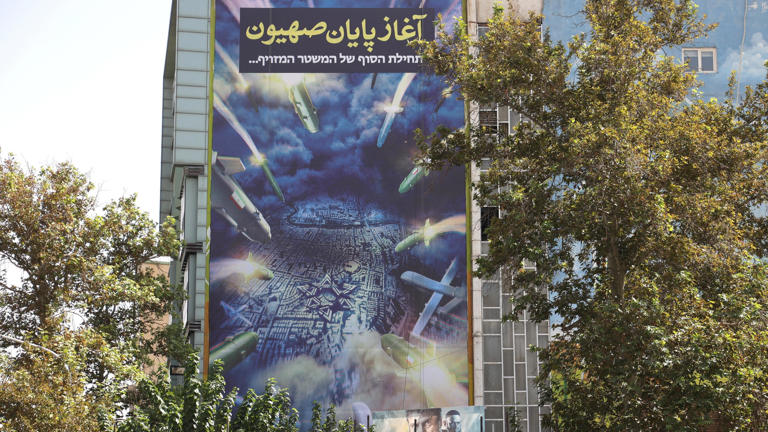
The commander-in-chief of Iran’s Islamic Revolution Guard Corps (IRGC), Maj-Gen Hossein Salami, stood in front of a large banner in a war room as he used a telephone to order the launch of about 200 ballistic missiles at Israel on Tuesday night, according to a video clip published by Iranian media.
The banner featured photos of the three men whose deaths he said Iran was seeking to avenge with the major attack – Hamas political leader Ismail Haniyeh, who was killed in Tehran in July in an attack that Iran blamed on Israel, and Hezbollah leader Hassan Nasrallah and IRGC Quds Force operations commander Brig-Gen Abbas Nilforoushan, who were killed in an Israeli air strike in Beirut last week.
The IRGC claimed the barrage included Fattah hypersonic missiles that took 12 minutes to reach Israel and that they successfully hit targets including three Israeli airbases and the headquarters of the Mossad spy agency.
However, the Israel Defense Forces (IDF) said most of the missiles were “intercepted by Israel and a defensive coalition led by the United States”, and that there were a “small number of hits” in central and southern Israel.
Shortly after the attack, a massive banner was raised in Tehran’s Palestine Square, featuring missiles flying towards buildings shaped like a Star of David and the words “The beginning of the end of Zionism”.
Iran had appeared to show restraint after Haniyeh’s assassination – but this inaction became a source of humiliation when Israel dealt a series of devastating blows to Iran’s closest and most longstanding regional ally Hezbollah, culminating in the air strike on Friday that killed Nasrallah and Nilforoushan.
Iranian weapons, training and funding have been pivotal to Hezbollah’s transformation into Lebanon’s most powerful armed force and political actor since the IRGC helped establish the group in the 1980s.
Before this month, Iranian leaders had hoped that a war of attrition with Hezbollah would help wear down the Israeli military, which is still fighting a war against Hamas in Gaza.
They also relied on Hezbollah and its massive arsenal of rockets and missiles to serve as a major deterrent against direct Israeli attacks on their country’s nuclear and missile facilities.
President Masoud Pezeshkian, who was elected in July, accused Israel of trying to provoke Iran into a regional war that would also draw in the US.
“We also want security and peace. It was Israel that assassinated Haniyeh in Tehran,” he was quoted by Iranian media as saying during a visit to Qatar on Wednesday.
“Europeans and the US said that if we do not act, there will be a peace in Gaza in one week. We waited for them to have peace but they increased their killing.”
Many hardline conservatives in Iran had been growing uneasy about the country’s lack of action against Israel.
Several commentators on state TV – which is controlled by the Supreme Leader, Ayatollah Ali Khamenei, and the IRGC – argued that the decision to hold back from seeking revenge for Haniyeh’s killing had emboldened Israeli Prime Minister Benjamin Netanyahu to attack Iran’s interests and allies in Lebanon.
After Tuesday’s missile attack, the chief of staff of the Iranian Armed Forces Maj Gen Mohammad Baqeri stated that the time for “patience and restraint” was over.
“We targeted military and intelligence sites in Israel and deliberately refrained from hitting economic and industrial locations,” he said. “However, if Israel retaliates, our response will be more forceful.”
The missile attack reflects a growing concern among Iranian leaders that remaining silent after Israel’s attacks would portray them as weak and vulnerable – both domestically and in the eyes of their regional allies in the so-called “Axis of Resistance” which includes Hezbollah and Hamas.
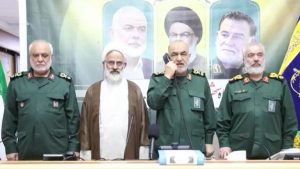
Maj-Gen Hossein Salami (2nd right) was filmed ordering Iran’s missile attack on Israel from a war room
© IRIB
Iran and Israel have pursued a shadow war for decades, adhering to a policy of “no war, no peace”. However, it now appears that this status quo is ending.
Israel has vowed to respond severely, with Netanyahu warning that “Iran made a big mistake and it will pay for it”.
There are also indications of a shift in tone and strategy from the US.
In April, President Joe Biden urged restraint after Israeli and US-led forces shot down most of the 300 drones and missiles that Iran launched at Israel in retaliation for an air strike on the Iranian consulate in Syria that killed several top IRGC commanders. Israel heeded the US call and responded by launching a missile that hit an Iranian air defence battery in central Iran.
But this time, Biden’s National Security Adviser Jake Sullivan warned there would be “severe consequences” for the Iranian attack and that the US will “work with Israel to make that the case”.
Israeli media cited Israeli officials as saying on Wednesday that Israel was preparing for retaliatory strikes on Iran “within days”, and that they would target “strategic sites”, including the country’s vital oil facilities.
The officials also warned that Iran’s nuclear facilities would be hit if it made good on its threat to strike back at Israel.
Senior Iranian officials have asserted that they consider their retaliation for the killing of Haniyeh, Nasrallah and Nilforoushan to be over unless they are provoked further.
Foreign Minister Abbas Araghchi also said he had conveyed a message to the US through the Swiss embassy in Tehran warning it “not to intervene”.
He cautioned: “Any third country that assists Israel or allows its airspace to be used against Iran will be considered a legitimate target.”
The US has approximately 40,000 troops stationed in the Middle East, with many deployed in Iraq and Syria. These troops could be threatened by Iran-backed Shia militias in both countries.
Iran must now brace itself for the Israeli response and hope its gamble pays off.
You may like


“You’re doing a fantastic job, I don’t care about your Party -Tinubu to Mbah
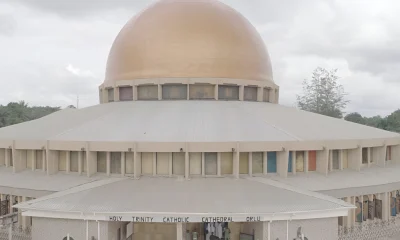

Bishop speaks on killing of boy by Catholic priest in South-east


‘You Should Not Resort To Disrespectful Politics’ – Afenifere, CUPP React As Obasanjo Slams NNPCL Over Invitation
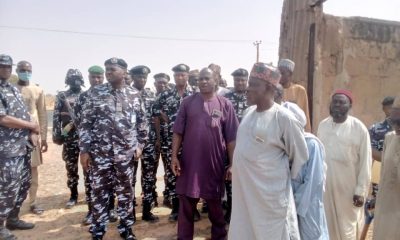

Two Kebbi policemen killed in gun duel with bandits


‘You’re my friend,’ Tinubu tells Enugu gov during road unveiling
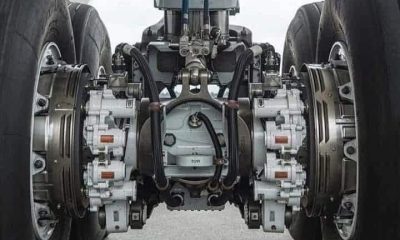

The wheels of an aircraft continue to spin and move immediately after takeoff.
Business
Nigerian Fuel Prices on Track to Crash to N500 Per Litre in 2025
Published
17 hours agoon
January 4, 2025By
Ekwutos Blog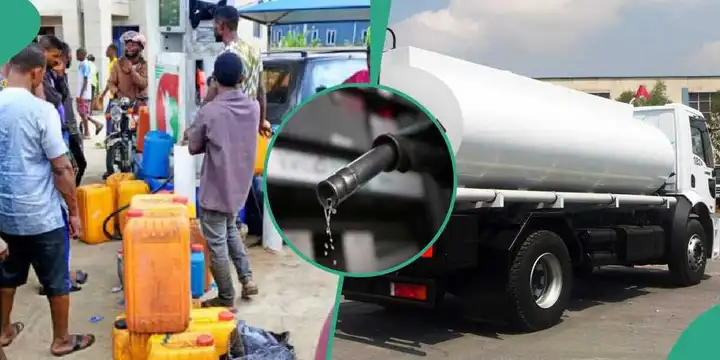
Oil marketers and other petroleum industry experts have forecast a reduction in petrol prices in 2025 to as much as N500/litre The resumption of operations of the Port Harcourt and Warri refineries will drive this anticipated crash in price They highlighted that a steady supply of petroleum products would encourage competition, leading to further price reductions
Petroleum product marketers and other stakeholders in Nigeria have projected a significant reduction in petrol prices by 2025. They highlighted that petrol, currently priced between N900 and N950 per litre at many filling stations, could drop to as low as N500 per litre during the year.
According to industry experts, this anticipated decline is attributed to the strengthening of the downstream sector, driven by the federal government’s deregulation policy.
Other factors contributing to the expected price reduction include a stable foreign exchange rate, increased price competition, the Naira-for-crude initiative, and the expected operations of the Port Harcourt, Warri, and Dangote refineries.
Stakeholders also noted that if these refineries supply the domestic market and accept payments in naira, it would further drive down petrol prices. Marketers share why fuel prices may reduce further The national publicity secretary of the Independent Petroleum Marketers Association of Nigeria (IPMAN), Ukadike Chinedu, described the upcoming operations of the Port Harcourt and Warri refineries as transformative for the downstream sector.
In an interview with Saturday Sun, he emphasised that these refineries would foster healthy price competition, a trend already becoming evident. He noted that both the Nigerian National Petroleum Company Ltd (NNPC) and Dangote have reduced petrol prices in recent weeks, highlighting the benefits of having multiple production sources rather than a monopoly. Ukadike expressed optimism that this development could drive petrol prices below N500 per litre by 2025 as more players enhance refining capacity. He also identified the federal government’s naira-for-crude policy as a critical factor in shaping petrol prices, predicting that it would curb inflation and ease pressure on foreign exchange.
The president of the Petroleum Products Retail Owners Association of Nigeria (PETROAN), Billy Gillis-Harry, expressed agreement with Ukadike’s views. He assured that the operational launch of the Port Harcourt and Warri refineries would result in more affordable fuel options for Nigerians.
Gillis-Harry emphasised that achieving lower petrol prices for consumers is a realistic prospect in 2025. Gillis-Harry said: ‘’As you can see, NNPC has reduced its ex-depot price from N1,045 per litre to N899 per litre for marketers, translating to N925 per litre at the pumps for the end users. This, I must say, is very commendable. These are not small drops, but massive drops from N1,045 to N899 ex- depot is a lot of drop.” He highlighted that a steady supply of petroleum products would encourage competition, leading to further price reductions in the coming year.
On his part, the publicity secretary of the Crude Oil Refiners Association of Nigeria (CORAN), Iche Idoko, stated that Nigerians would soon start experiencing the benefits of a deregulated market.
Idoko said: “Price drop is one of the characteristics of deregulation we had highlighted. As the industry settles in to the regime of full deregulation, we are bound to see competitions amongst players, which ultimately will benefit the consumers.”
He explained that competition would emerge in pricing, product quality, and credit facilities offered to bulk purchasers.
Marketers import 2.3bn litres of petrol In related news, Legit.ng reported that oil marketers have continued to import petrol into the country despite earlier agreements to patronise local refineries. Documents obtained from the Nigerian Ports Authority revealed that marketers have persisted in petrol importation. The data collected showed that imported petrol was docked at the Apapa Port, Tin Can Port and the Calabar Port.
Business
CBN: 1000 Exit Staff were voluntary – Cardoso
Published
22 hours agoon
January 4, 2025By
Ekwutos Blog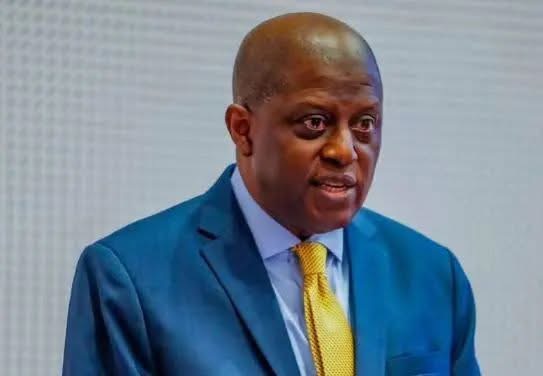
Olayemi Cardoso, governor of the Central Bank of Nigeria (CBN), said the 1,000 staff who left the bank were not forced to leave.
Cardoso spoke on Friday at the resumed house of representatives investigative hearing on the disengagement of the 1,000 workers by CBN.
On December 4, 2024, the apex bank said its early exit package (EEP) was entirely voluntary and without any negative repercussions for eligible staff.
CBN’s statement followed reports that 1,000 staff were sacked from the apex bank.
Reacting to the development, the house of representatives asked the CBN to suspend the “planned” retirement of 1,000 staff.
The lower chamber had also set up an ad hoc committee to investigate the “process and legality” of the exercise.
However, on Friday at the resumption of the investigative hearing, the CBN governor said the 1,000 members of staff were not forced to quit.
Cardoso, who was represented by Bala Bello, CBN’s deputy director of corporate service, also said the early exit programme, the restructuring and reorganisation was to optimise the bank for enhanced efficiency.
“They are basically ways and means through which the performance of an organisation is optimised by putting, ensuring that round pegs are put in right holes,” Cardoso said.
“The manpower requirement of the bank is actually met.
“I’m very happy to mention, Mr. Chairman and members of the committee, that the early exit program of the central bank is 100 percent voluntary.
“I believe several organisations across the world, and even within this country, both in the private sector and the public sector, are undertaking similar exercises. So nobody has been asked to leave. With a lot of humility, I will tell you that this same program that is taking place is not at the instance of the bank.”
‘CBN FACED WITH SEVERAL CHALLENGES, INCLUDING LACK OF CAREER GROWTH’
Cardoso said CBN had been faced with several challenges.
Credit: The Cable
Business
NNPC INVITES OBASANJO TO INSPECT PORT HARCOURT REFINERY.
Published
3 days agoon
January 2, 2025By
Ekwutos Blog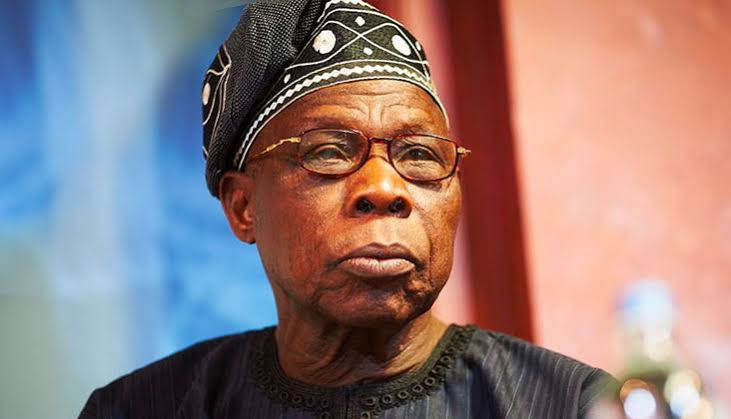
The Nigerian National Petroleum Company Limited(NNPCL)has invited former President Olusegun Obasanjo to visit the Port Harcourt Refinery.
This follows his recent comments questioning its functionality.
Obasanjo had referenced concerns raised by Shell Petroleum Development Company (SPDC)about potential corruption affecting the refinery’s operations.
He also claimed that NNPCL had misrepresented the refinery’s operational status.
In response,NNPCL’s Chief Corporate Communications Officer, Mr. Olufemi Soneye, offered Obasanjo the chance to tour the refinery, emphasizing the company’s commitment to openness.
Soneye highlighted that the refinery had undergone extensive rehabilitation, going beyond previous turnaround maintenance to a complete overhaul.
Soneye also invited Obasanjo to join NNPCL’s efforts to strengthen Nigeria’s energy security.
He clarified that NNPCL had transformed into a profit-driven private entity,moving away from its previous loss-making status.
Additionally,Soneye addressed reports claiming that NNPCL would cease crude oil supply to Dangote Refinery,dismissing them as false.

“You’re doing a fantastic job, I don’t care about your Party -Tinubu to Mbah

Bishop speaks on killing of boy by Catholic priest in South-east

‘You Should Not Resort To Disrespectful Politics’ – Afenifere, CUPP React As Obasanjo Slams NNPCL Over Invitation
Trending
- Politics11 months ago
Nigerian Senate passes Bill seeking the establishment of the South East Development Commission.

 Business11 months ago
Business11 months agoInflation hits record high of 29.90% on naira weakness

 Politics7 months ago
Politics7 months agoBREAKING: Federal Gov’t Offers To Pay Above N60,000, Reaches Agreement With Labour

 SportsNews10 months ago
SportsNews10 months agoOlympic Qualifiers 2024: CAF Confirms Dates For Super Falcons Vs Banyana Banyana

 Politics10 months ago
Politics10 months agoGovernor Hope Uzodinma’s New Cabinet In Imo: The Gainers, The Losers
- Entertainment11 months ago
American Singer Beyonce makes history as first Black woman to top country chart

 Trending2 months ago
Trending2 months agoNYA demands release of ‘abducted’ Imo chairman, preaches good governance
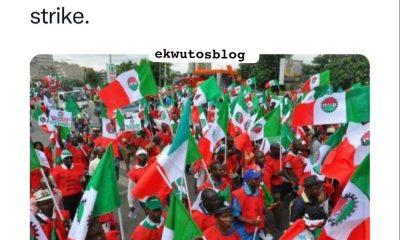
 Politics7 months ago
Politics7 months agoBREAKING: Organized Labour suspends strike for one week.

